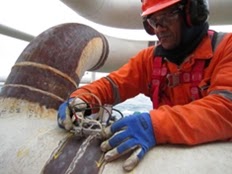ATI Inspection Systems is pleased to announce the appointment of the new CEO, Chris Walters. After the recent reversal of Encore Capital LLP, the appointment of this key post is the next step in the strategic development of advanced NDT Company.
Former managing director and co-owner of ATI Inspection Systems, Dr. David Topp said "I am delighted to welcome Chris to the business as CEO. He brings a wealth of experience and is looking forward to the challenge of continuing ATI growth in new sectors and markets. His appointment means that I can trust to step back from the day to day business, knowing you're in good hands. I really want to support Chris while the strategy is developed ATI and leads through its transition from a product-based business to a provider of technology and services more rounded. "
Former managing director and co-owner of ATI Inspection Systems, Dr. David Topp said "I am delighted to welcome Chris to the business as CEO. He brings a wealth of experience and is looking forward to the challenge of continuing ATI growth in new sectors and markets. His appointment means that I can trust to step back from the day to day business, knowing you're in good hands. I really want to support Chris while the strategy is developed ATI and leads through its transition from a product-based business to a provider of technology and services more rounded. "
A chartered engineer and naval architect, Chris has a successful track record in driving innovation and leading business growth in the Oil and Gas Marina, and with extensive international experience in senior positions at Lloyds Register and the Group P & O.
"I am proud and honored to join ATI and be part of a talented team with an outstanding history and reputation in advanced NDT. Working with our experienced, highly motivated staff and executive team, I am excited about leading the business to generate growth in new and established. Markets, "said Chris. He added that "In the last 25 years, the ATI ACFM® technology has played an important role in ensuring the safety and structural integrity around the world, especially in the field of oil and gas offshore. With the strong support of our investors, now is a great opportunity to expand our international operations and support to our customers with its submarine and ground inspection campaigns ".
During the last twelve months there have been some important changes for ATI Inspection Systems, including a relocation of its headquarters in Milton Keynes to new facilities with research facilities and significant development. New technical and operational centers have also been established in Aberdeen and Singapore, providing rental ACFM® systems, certificates and training services operators, enabling service delivery responsiveness and focused technical support to local customers.
"We are delighted to have Chris on board with ATI in such instrumental in the development of the company. Point" stated Dimitri Tzililis, Encore equity partner. "The challenging operating environment has produced many opportunities for ATI to offer profitable inspection solutions for a global customer base growing. Chris will oversee the deployment of our new offer centered service and expansion into new territories, including Southeast Asia and the Americas. ATI Inspection Systems Encore is a key investment in the area of advanced engineering with significant capital behind it to support the organic and inorganic growth. We have the highest level of confidence in Chris and we believe his leadership even more impressive expand ATI record of innovation and continuous value creation. "
"I am proud and honored to join ATI and be part of a talented team with an outstanding history and reputation in advanced NDT. Working with our experienced, highly motivated staff and executive team, I am excited about leading the business to generate growth in new and established. Markets, "said Chris. He added that "In the last 25 years, the ATI ACFM® technology has played an important role in ensuring the safety and structural integrity around the world, especially in the field of oil and gas offshore. With the strong support of our investors, now is a great opportunity to expand our international operations and support to our customers with its submarine and ground inspection campaigns ".
During the last twelve months there have been some important changes for ATI Inspection Systems, including a relocation of its headquarters in Milton Keynes to new facilities with research facilities and significant development. New technical and operational centers have also been established in Aberdeen and Singapore, providing rental ACFM® systems, certificates and training services operators, enabling service delivery responsiveness and focused technical support to local customers.
"We are delighted to have Chris on board with ATI in such instrumental in the development of the company. Point" stated Dimitri Tzililis, Encore equity partner. "The challenging operating environment has produced many opportunities for ATI to offer profitable inspection solutions for a global customer base growing. Chris will oversee the deployment of our new offer centered service and expansion into new territories, including Southeast Asia and the Americas. ATI Inspection Systems Encore is a key investment in the area of advanced engineering with significant capital behind it to support the organic and inorganic growth. We have the highest level of confidence in Chris and we believe his leadership even more impressive expand ATI record of innovation and continuous value creation. "






